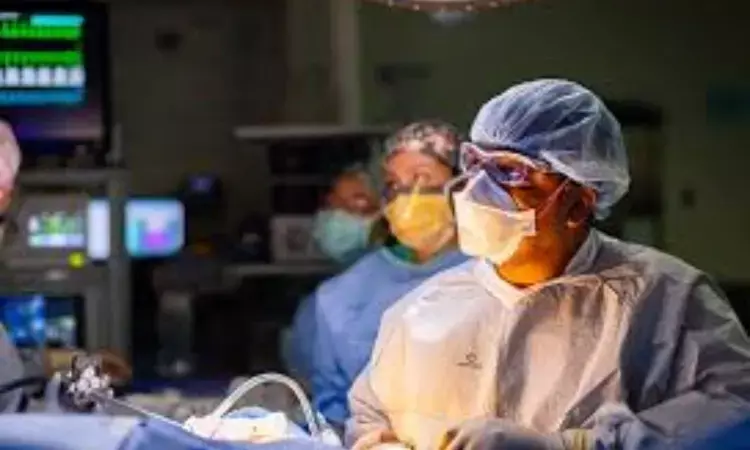- Home
- Medical news & Guidelines
- Anesthesiology
- Cardiology and CTVS
- Critical Care
- Dentistry
- Dermatology
- Diabetes and Endocrinology
- ENT
- Gastroenterology
- Medicine
- Nephrology
- Neurology
- Obstretics-Gynaecology
- Oncology
- Ophthalmology
- Orthopaedics
- Pediatrics-Neonatology
- Psychiatry
- Pulmonology
- Radiology
- Surgery
- Urology
- Laboratory Medicine
- Diet
- Nursing
- Paramedical
- Physiotherapy
- Health news
- Fact Check
- Bone Health Fact Check
- Brain Health Fact Check
- Cancer Related Fact Check
- Child Care Fact Check
- Dental and oral health fact check
- Diabetes and metabolic health fact check
- Diet and Nutrition Fact Check
- Eye and ENT Care Fact Check
- Fitness fact check
- Gut health fact check
- Heart health fact check
- Kidney health fact check
- Medical education fact check
- Men's health fact check
- Respiratory fact check
- Skin and hair care fact check
- Vaccine and Immunization fact check
- Women's health fact check
- AYUSH
- State News
- Andaman and Nicobar Islands
- Andhra Pradesh
- Arunachal Pradesh
- Assam
- Bihar
- Chandigarh
- Chattisgarh
- Dadra and Nagar Haveli
- Daman and Diu
- Delhi
- Goa
- Gujarat
- Haryana
- Himachal Pradesh
- Jammu & Kashmir
- Jharkhand
- Karnataka
- Kerala
- Ladakh
- Lakshadweep
- Madhya Pradesh
- Maharashtra
- Manipur
- Meghalaya
- Mizoram
- Nagaland
- Odisha
- Puducherry
- Punjab
- Rajasthan
- Sikkim
- Tamil Nadu
- Telangana
- Tripura
- Uttar Pradesh
- Uttrakhand
- West Bengal
- Medical Education
- Industry
Study Reveals High Rates of UTIs and SSIs Following Gender-Affirming Vaginoplasty

USA: A recent study published in Open Forum Infectious Diseases revealed that urinary tract infections (UTIs) and surgical site infections (SSIs) are the most frequently occurring infections after gender-affirming vaginoplasty, with reported incidence rates of 17.5% and 5.5%, respectively.
Radhika Sheth, Division of Infectious Disease, Oregon Health & Science University, Portland, Oregon, USA, and colleagues conducted a retrospective cohort study to examine the epidemiology and incidence of infections following gender-affirming vaginoplasty.
The study included adults who underwent vaginoplasty at a single tertiary care center in Portland, Oregon, between 2016 and 2023. Surgical site infections were defined by at least two symptoms occurring within six months of surgery: fever, purulent drainage, localized pain, tenderness, wound dehiscence, necrosis, or increased edema or erythema. Sexually transmitted infections (STIs) were identified by a positive nucleic acid amplification test (NAAT) or a reactive rapid plasma regain test with titers indicative of a new syphilis diagnosis. Urinary tract infections were defined as cystitis or at least one symptom of pyelonephritis—such as dysuria, frequency, suprapubic pain, flank pain, or fever—that led to an antibiotic prescription. Univariable logistic regression identified factors associated with infection risk.
The study included 398 participants with a median age of 39, of whom 80% were White and 86.5% were non-Hispanic. Among these, 381 individuals underwent primary vaginoplasty, while 17 had a revision of the initial surgery.
The study led to the following findings:
- The overall incidence of infection was 1.25 per 1000 person-years, with a median time to infection of 53 days after vaginoplasty.
- Urinary tract infections:
- 17.5% of patients developed UTIs.
- Of these, 87.1% had an available urine culture.
- The two most common pathogens were Escherichia coli (38.5%) and Klebsiella pneumoniae (8.5%).
- Nine UTIs were treated empirically, and 24 were treated despite negative urine cultures.
- Surgical site infections:
- 5.5% of patients developed SSIs.
- 86.3% of these were treated empirically without wound cultures.
- Of the three patients with wound cultures, two grew polymicrobial skin flora, and one grew methicillin-susceptible Staphylococcus aureus.
- Bacteremia and Pelvic Abscess:
- There were three episodes of bacteremia.
- One patient developed a pelvic abscess.
- Sexually Transmitted Infections:
- Two STIs were identified, but neither involved neogenitalia.
- HIV Status:
- Sixteen patients were living with HIV and on antiretroviral therapy (ART) at the time of vaginoplasty.
- Of these, 11 had an undetectable viral load in the year before surgery.
- Among patients without known HIV, 22.5% were screened within 1 year before vaginoplasty, and 6% were prescribed pre-exposure prophylaxis (PrEP).
- After surgery, 19.1% of patients were screened for HIV, with no new diagnoses reported.
"Our study contributes valuable insights to the limited data on infectious complications following gender-affirming vaginoplasty (GAV). Healthcare providers should remain vigilant regarding the risk of postoperative urinary tract infections and surgical site infections as the demand for GAV continues to rise," the researchers wrote.
"Additional research is necessary to identify specific risk factors for infections in this patient group. Furthermore, HIV screening and the provision of pre-exposure prophylaxis for this high-risk population should be prioritized. Ongoing studies are also essential to refine antibiotic therapy and stewardship strategies for individuals undergoing GAV," they concluded.
Study limitations include missed infection diagnoses, potential misclassification, small sample size, and possible overestimation of PrEP use.
Reference:
Sheth, R., Bhaskara, A., Brown, H., Varley, C. D., Streifel, A., Maier, M., Sikka, M. K., & Evans, C. (2024). Infections Following Gender-Affirming Vaginoplasty: A Single-Center Experience. Open Forum Infectious Diseases, 11(10). https://doi.org/10.1093/ofid/ofae526
Dr Kamal Kant Kohli-MBBS, DTCD- a chest specialist with more than 30 years of practice and a flair for writing clinical articles, Dr Kamal Kant Kohli joined Medical Dialogues as a Chief Editor of Medical News. Besides writing articles, as an editor, he proofreads and verifies all the medical content published on Medical Dialogues including those coming from journals, studies,medical conferences,guidelines etc. Email: drkohli@medicaldialogues.in. Contact no. 011-43720751


